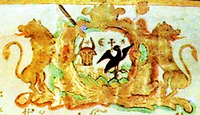
Constantine Ypsilantis
Encyclopedia
Constantine Ypsilantis was the son of Alexander Ypsilanti, a key member of an important Phanariote family, Grand dragoman
of the Porte (1796-99), hospodar
of Moldavia (1799–1802) and Walachia (1802–06), and a Prince through marriage to the daughter of Alexandru Callimachi.
 Ypsilantis had joined in a conspiracy to liberate Greece
Ypsilantis had joined in a conspiracy to liberate Greece
and, on its discovery, fled to Vienna
, had been pardoned by the sultan and in 1799 appointed by him hospodar
of Moldavia
. Deposed in 1805, he escaped to St Petersburg, and in 1806, at the head of some 20,000 Russians
, returned to Bucharest
, where he set to work on a fresh attempt to liberate Greece.
Ypsilantis' plans were ruined by the peace of Tilsit and in 1807 he emigrated with his family to Russia.
: Alexander and Demetrios.
Dragoman
A dragoman was an interpreter, translator and official guide between Turkish, Arabic, and Persian-speaking countries and polities of the Middle East and European embassies, consulates, vice-consulates and trading posts...
of the Porte (1796-99), hospodar
Hospodar
Hospodar or gospodar is a term of Slavonic origin, meaning "lord" or "master".The rulers of Wallachia and Moldavia were styled hospodars in Slavic writings from the 15th century to 1866. Hospodar was used in addition to the title voivod...
of Moldavia (1799–1802) and Walachia (1802–06), and a Prince through marriage to the daughter of Alexandru Callimachi.
The Liberation of Greece from the Ottoman Empire

Greece
Greece , officially the Hellenic Republic , and historically Hellas or the Republic of Greece in English, is a country in southeastern Europe....
and, on its discovery, fled to Vienna
Vienna
Vienna is the capital and largest city of the Republic of Austria and one of the nine states of Austria. Vienna is Austria's primary city, with a population of about 1.723 million , and is by far the largest city in Austria, as well as its cultural, economic, and political centre...
, had been pardoned by the sultan and in 1799 appointed by him hospodar
Hospodar
Hospodar or gospodar is a term of Slavonic origin, meaning "lord" or "master".The rulers of Wallachia and Moldavia were styled hospodars in Slavic writings from the 15th century to 1866. Hospodar was used in addition to the title voivod...
of Moldavia
Moldavia
Moldavia is a geographic and historical region and former principality in Eastern Europe, corresponding to the territory between the Eastern Carpathians and the Dniester river...
. Deposed in 1805, he escaped to St Petersburg, and in 1806, at the head of some 20,000 Russians
Russians
The Russian people are an East Slavic ethnic group native to Russia, speaking the Russian language and primarily living in Russia and neighboring countries....
, returned to Bucharest
Bucharest
Bucharest is the capital municipality, cultural, industrial, and financial centre of Romania. It is the largest city in Romania, located in the southeast of the country, at , and lies on the banks of the Dâmbovița River....
, where he set to work on a fresh attempt to liberate Greece.
The Union of Moldavia and Wallachia
From 1806, during Russian occupation of the Principalities of Moldavia and Wallachia, Russia encouraged their provisional union under Prince Constantine Ypsilanti. Russia preferred their union for improved relations with the Principalities and their formal union was planned for 1830.Ypsilantis' plans were ruined by the peace of Tilsit and in 1807 he emigrated with his family to Russia.
Legacy
Ypsilantis died, in Kiev, where he had served as commandant of the Pechersk Fortress since 1807. He left five sons, of whom two played a conspicuous part in the Greek War of IndependenceGreek War of Independence
The Greek War of Independence, also known as the Greek Revolution was a successful war of independence waged by the Greek revolutionaries between...
: Alexander and Demetrios.
Sources
- East, The Union of Moldavia and Wallachia, 1859 - An Episode in Diplomatic History, Thirlwall PrizeThirlwall PrizeSince 1884, the Thirlwall Prize was instituted at Cambridge University, England, in the memory of Bishop Connop Thirlwall, and has been awarded during odd-numbered years, for the best essay about British history or literature for a subject with original research...
Essay for 1927, Cambridge University Press (1929).

